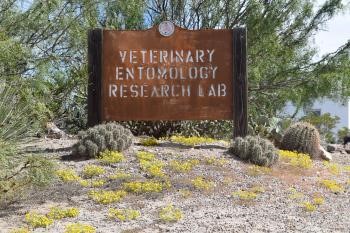Veterinary Entomology Research Laboratory
The Veterinary Entomology Research Laboratory of New Mexico State University is home to a state-of-the-art large animal research facility located on 45 acres, with a 5000 sq. ft. large animal laboratory, capable of housing 22 individual animals in environmentally controlled rooms. Our laboratory maintains multiple insect-rearing facilities for major ectoparasites of man and animals and routinely conducts research studies aimed at controlling house flies, stable flies, horn flies, face flies, mosquitoes, lice, mites, and ticks. We specialize in parasiticide safety and general assessments of efficacy against multiple arthropod species. Additionally, our facility is equipped to house more than 100 large animals at any time and we maintain up to 60 individual partially shaded outdoor animal pens for specialized assessments. Our animal housing is centered around multiple cattle working facilities with certified scales and weights, artificial rainfall systems, and UV protected dry lot pens.

Major Areas of Research
Major Areas of Research Includes:
- Characterization of insecticide resistance in the horn fly, Haematobia irritans (L.): documentation of cross-resistance; evaluation of biochemical, physiological and behavioral mechanisms; defining ecological parameters influencing the evolution of resistance
- Biology, ecology, distribution and population dynamics of arthropods influencing livestock production management strategies
- Design and implementation of model, integrated pest management programs for livestock (interdisciplinary approach involving nutritionist, parasitologist, veterinarian and economist)
- Vector-borne Diseases: Vector blood-feeding behavior as it relates to transmission of pathogenic agents to animals(Dog Heartworm, West Nile Virus, Vesicular Stomatitis Virus, Anaplasmosis, Bluetongue Virus, Plague)
Current Research Projects
- Biochemical and Genetic Factors Affecting Insecticide Resistance in Selected Arthropods
- Interaction of Insecticide Resistance and Life History Traits in Haematobia irritans
- Physiological Responses of Beef Cattle to Ectoparasite Infestations
- Comparison of Genetic Variation in Diamanus montanus with the Occurrence of Yersinia pestis in Humans
- West Nile Virus: Patterns, Establishment and Maintenance of an Exotic Pathogen in an Arid Environment
Contact Us
